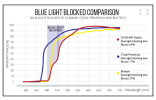ok cool, that makes sense for sure. So at night it would be advisable to get the IR bulbs, or just use candle light when possible.
I've also read that it's not just the eyes but the skin that absorbs the light, so when exposing to sunlight it's good to get as much skin as possible, and at night or when under artificial light it's best to cover as much of the skin as you can. I'm pretty sure it was one of Jack Kruse's articles but I can't seem to to find it at the moment. I have been trialing doing this at work, since I'm in a TV studio most of the day under very strong artificial light, I make sure I roll down my sleeves to cover my arms and wear long pants, all I need now is some lenses to block the the lights without looking like an idiot and freaking out the students haha.
I've also taken to having my morning salt water and smoke looking at the sun (not directly) but getting that good light in the eyes to set my circadian rhythm, I must admit since I started doing it around 6 months ago I have noticed better sleep and being more alert in the morning, which is especially something new for me, I've never been a morning person.
I've also read that it's not just the eyes but the skin that absorbs the light, so when exposing to sunlight it's good to get as much skin as possible, and at night or when under artificial light it's best to cover as much of the skin as you can. I'm pretty sure it was one of Jack Kruse's articles but I can't seem to to find it at the moment. I have been trialing doing this at work, since I'm in a TV studio most of the day under very strong artificial light, I make sure I roll down my sleeves to cover my arms and wear long pants, all I need now is some lenses to block the the lights without looking like an idiot and freaking out the students haha.
I've also taken to having my morning salt water and smoke looking at the sun (not directly) but getting that good light in the eyes to set my circadian rhythm, I must admit since I started doing it around 6 months ago I have noticed better sleep and being more alert in the morning, which is especially something new for me, I've never been a morning person.

